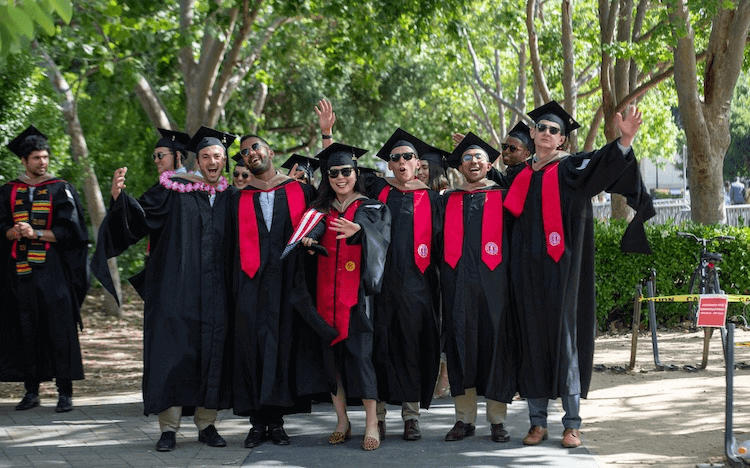If you’re looking to enroll in an MBA, work experience is a key MBA entry requirement.
Many schools have a minimum work experience requirement for candidates and won’t even consider your application if you don’t have enough years under your belt.
Even if you have the minimum amount of experience for a top program, you may still miss out on a place as admissions teams often value more experienced candidates.
Figuring out just how much work experience you need before you apply to an MBA is a key part of your MBA application process.
Average MBA work experience for top programs
Across the Financial Times’ 10 highest ranking MBA programs in 2023, the average MBA work experience of each cohort is between five and six years.
At Columbia University, the world’s top MBA in 2023, the cohort has an average of five years of work experience. That’s despite the school accepting students with as little as under one years’ work experience.
Similarly, second placed INSEAD recommends two years of work experience before applying to its MBA, yet the average across their cohort is five-and-a-half years.
Duke University’s Fuqua Business School and HEC Paris both have more experienced cohorts with a higher average number of years of work experience. Most members of their respective cohorts have six years of experience.
Some schools also require a minimum of two years of work experience to apply, and won’t accept applications below this requirement. Among the top 10 this includes Northwestern University’s Kellogg School of Management, CEIBS, HEC Paris, and Dartmouth University’s Tuck School of Business.
It’s a similar story further down the Financial Times ranking. The average MBA work experience across the top 20 programs worldwide is also around 5.3 years.
Shelly Heinrich, associate dean of MBA admissions at Georgetown University McDonough School of Business, gives two reasons for schools’ preference for more experienced applicants.
“Firstly, so much of the MBA curriculum relies on the context of industry or professional experience,” she says. “Students are also able to better understand the concepts if they have some experience to relate to.
“Secondly, MBA employers typically hire students with prior work experience, and those with between three and six years are usually the most competitive,” she adds.
READ: MBA Acceptance Rates At The World's Top Business Schools ©Stanford Business School Facebook
©Stanford Business School Facebook
Average work experience for M7 MBA programs
At Stanford Graduate School of Business, the world’s hardest MBA to get into, the average work experience among the 2023 cohort is under five years, making it the lowest among the M7 MBA programs and FT’s top 20 business schools.
The University of Pennsylvania’s Wharton School (which didn’t feature in the 2023 FT ranking) has an average of five years, as does Harvard Business School, Columbia Business School, and MIT Sloan School of Management.
When paired with the University of Chicago’s Booth School of Business and Northwestern University Kellogg School of Management, the average amount of work experience on an M7 MBA is five years.
Applying for an MBA without work experience
While most schools will simply recommend a minimum amount of experience before applying, some will refuse applications that don’t meet the required number of years. So, is it possible to apply for an MBA with below average experience? Or even none at all?
Technically you could apply to programs that don’t have a hard rule on minimum MBA work experience in their application requirements. Schools including the likes of NYU Stern, University of Washington Foster School of Business, and Yale School of Management all have no specific experience requirement.
MBA admissions teams will also look at your application holistically, considering all the various elements including your GMAT score, GPA, and how well you perform in the interview process. This means there's a chance you could be accepted without experience.
Another option—though one which ultimately will require you to gain some experience—is a deferred MBA program. These allow college seniors or masters students to apply before they graduate and have any professional experience. Schools accept applicants on the condition that they complete work experience before they enter the course.
The Harvard 2+2 program is an example of such a scheme, requiring successful applicants to spend two years working full-time before they join the two-year MBA program.
If you’re applying to a top school, you should acquire the necessary experience first to give yourself the best possible chance of success, thinks David White, MBA admissions consultant and founding partner of Menlo Coaching.
“MBA programs prefer to admit candidates with four or five years of pre-MBA work experience because those students are likely to have a few leadership experiences, which prepares them well for further leadership development,” he says.
So if you’re considering applying to a top MBA program, before you start thinking about application rounds, essay questions, and everything else included in an MBA application, securing work experience should be your first step.
MBA Work Experience: World's Best Programs
Next Read:
MBA Application Deadlines 2023-2024 | Harvard, Columbia & More Top Business Schools



